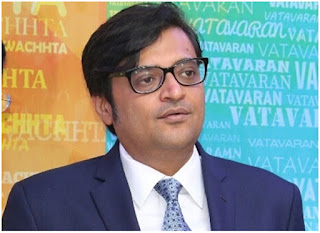Cases against Arnab Goswami undermine the rule of law
The filing of more than 100 first information reports (FIRs) against Republic TV editor-in-chief Arnab Goswami has not just shown the vulnerability of the press; it has also bared the shaky foundation of the rule of law.
The question here is not whether Goswami was correct in comments on Congress president Sonia Gandhi after the lynching of Hindu Sadhus at Palghar in Maharashtra on April 16. Was it journalism or activism? I am nobody to judge him; let people do that; besides, that is not the moot question. The moot question here is the rule of law.
The rule of law, which is the basis of civilization, implies preexisting, objective pieces of legislation that govern life in a country. The true ruler is not a man or a group of men and women but the law; those who govern do so in accordance with the predefined rules and regulations. It is the law that is majestic, not the men and women enforcing it. This is the reason that in monarchies royal personages, embodying the law, are addressed as ‘Your Majesty’ and referred to as ‘His or Her Majesty.’
In short, the rule of law is the essence of human civilization, surely of the modern civilization where democracy and individual liberty are generally regarded as sine qua non.
The police cases against Goswami are the antitheses of the rule of law, for they suggest the rule of men and women rather than of law. The cases were filed in five states, four of which are under the Congress; none of them has a Bharatiya Janata Party government.
This raises several questions: How could so many people in five states simultaneously get so enraged as to lodge criminal complaints against a journalist? More importantly, why couldn’t they file a single case in a BJP-ruled state? Why is it that police officers in non-BJP states see felony against Sonia but no cop in the states under the BJP sees any wrongdoing carried out by Goswami? Is it because the celebrity journalist is regarded as close to the BJP?
It looks like that criminality of an action in India is determined not by the action itself but by the actor’s equation with those in power. But then it is the rule by men and women, not the rule of law.
The cases against Goswami are also a demonstration of power that any political party or leader or consequence enjoys, the power that can be used against anybody the powerful dislike. The issue involved here is much more than freedom of the media; it is about freedom of expression per se, indeed about the very concept of individual liberty.
In a way, the Congress party’s tactics are aimed at preventing prominent personalities from expressing their views freely in a public forum. This is not to say that other parties and groups don’t adopt such tactics; saffron parties and outfits are no different. What makes the Congress’ jihad against Goswami stark is the party’s profession of liberal values and sermons on tolerance. This jihad is intended to mute the voice of the target and deter others from getting too critical.
In the 1980s, University of Denver professors Penelope Canan and George W. Pring coined a term, SLAPP, or Strategic Lawsuit Against Public Participation. This was a ploy to censor, intimidate, subdue and possibly silence anybody by imposing the cost and harassment of a legal defence.
In India, however, SLAPP is not always ‘strategic’; it may be just some publicity-seeker or downright blackmailer who achieves his goals by legal means. The user can also be a political party, as in the present instant.

Comments
Post a Comment